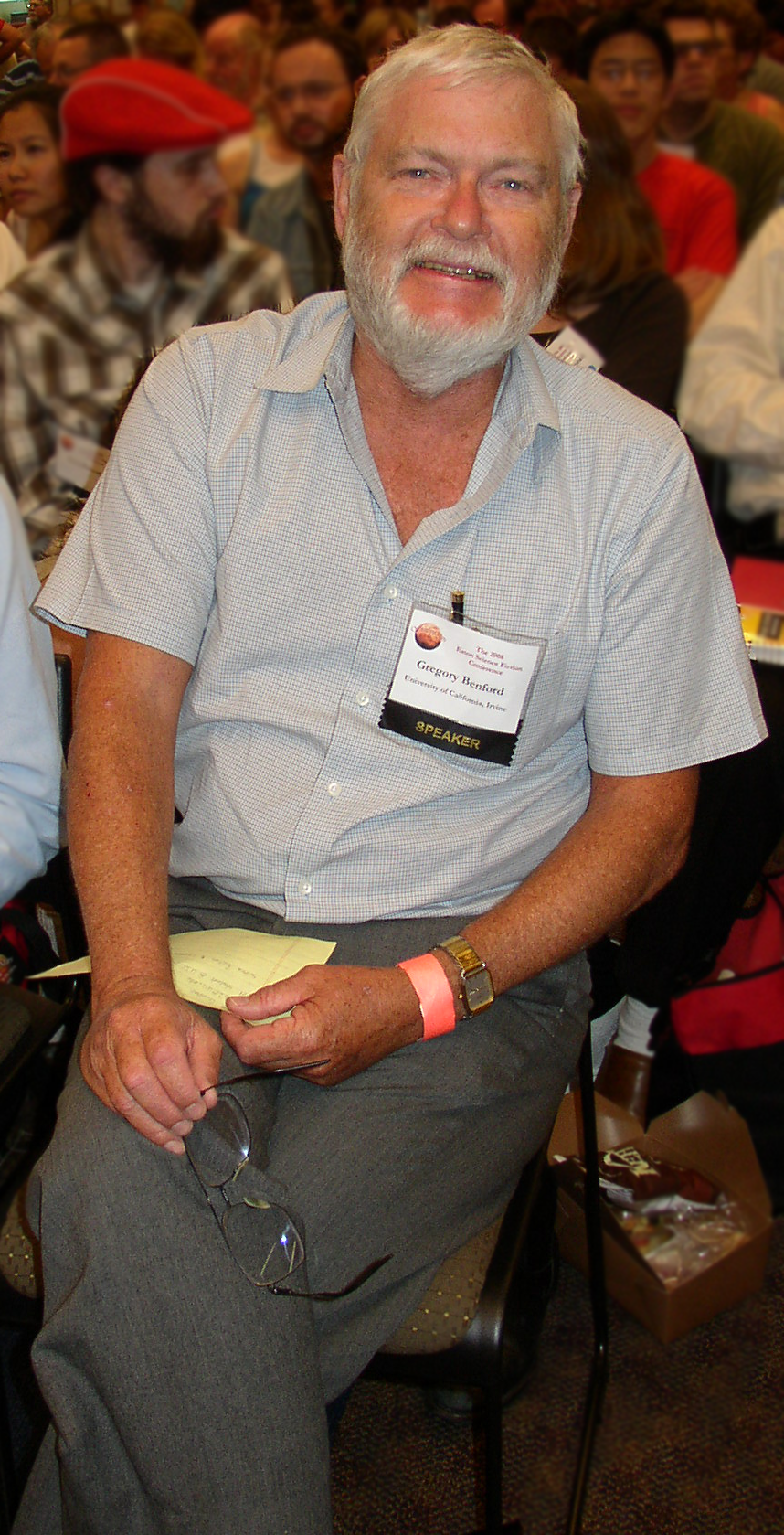„Любая технология, отличная от магии, является несовершенной.“
«Страхи Основания»
часть 3, глава 2 (парафраз 3-го закона Кларка)
Из произведений
Грегори Бенфорд — американский астрофизик и писатель-фантаст. Профессор кафедры физики и астрономии Калифорнийского университета в Ирвайне, где он преподает с 1971 года. Действительный член Американского физического общества. Редактор журнала Reason. Получил наибольшую известность как автор серии романов Galactic Center Saga. Имеет брата-близнеца Джеймса, который выступил соавтором нескольких рассказов. Публично поддерживает крионику. Wikipedia

„Любая технология, отличная от магии, является несовершенной.“
«Страхи Основания»
часть 3, глава 2 (парафраз 3-го закона Кларка)
Из произведений
SF is a controlled way to think and dream about the future. An integration of the mood and attitude of science (the objective universe) with the fears and hopes that spring from the unconscious. Anything that turns you and your social context <…> inside out. Nightmares and visions, always outlined by the barely possible.
Источник: James E. Gunn and Matthew Candelaria, Speculations on Speculation: Theories of Science Fiction, Scarecrow Press, 2005, p. 343. ISBN 0-8108-4902-X
His Marxism, which remained his only irrational faith throughout his life, told him that surely the United States could never be a positive influence.
предисловие к «Последним и первым людям», 1987
Источник: Foreword (1987) by Gregory Benford // Olaf Stapledon, Last and First Men (Series: SF Masterworks); London: Gollancz Books 1999, p. x.
Benford early established himself though his solo work as a leading writer of Hard SF, although much of his writing also has a lyrical aspect reminiscent of Poul Anderson, and his larger-scale tales have an almost impersonal sweep typical of the Scientific Romance epics of his younger contemporary Stephen Baxter,.. <…> Though his grasp of character sometimes falters, and complicated political/cultural arguments about the contemporary world are sometimes conveyed with excessive assurance, Benford's work continues to play formidable intellectual games with readers willing to think harder than normal...
Брайан Стэблфорд, Джон Клют, Энциклопедия научной фантастики, 2011
Источник: Benford, Gregory http://sf-encyclopedia.com/entry/benford_gregory // SFE: The Encyclopedia of Science Fiction, online edition, 2011—.
“Deep ignorance, but still a kind that knew its limits. The limits were crucial.”
Источник: Timescape (1980), Chapter 31 (p. 360)
Контексте: You had to form for yourself a lucid language for the world, to overcome the battering of experience, to replace everyday life’s pain and harshness and wretched dreariness with — no not with certainty but with an ignorance you could live with. Deep ignorance, but still a kind that knew its limits. The limits were crucial.
“Passion was inversely proportional to the amount of real information available.”
Источник: Timescape (1980), Chapter 14 (p. 182, known as Benford's law of controversy)
Контексте: It was an example of what he thought of as the Law of Controversy: Passion was inversely proportional to the amount of real information available.
The Snark, p. 195
In the Ocean of Night (1977)
Контексте: Organic forms are in the universe of things and also reside in the universe of essences. There we cannot go. … You are a spontaneous product of the universe of things. We are not. This seems to give you … windows. It was difficult for me to monitor your domestic transmissions, they fill up with branches, spontaneous paths, nuances…
“Trouble comes looking for you if you’re a fool.”
To the Storming Gulf, p. 126 (Originally published in Fantasy & Science Fiction, April 1985)
In Alien Flesh (1986)
Part 6 “Aleph Null”, Chapter 4 (p. 226)
Against Infinity (1983)
“Soldiers for equality, uh? Glad you warned me. I’d have thought you were just thieves.”
Part 4 “Hiruko: Six Years Later”, Chapter 1 (p. 148)
Against Infinity (1983)
Nooncoming, p. 100 (Originally published in Universe 8, edited by Terry Carr), 1978
In Alien Flesh (1986)
Part 2 “Aleph”, Chapter 2 (p. 51)
Against Infinity (1983)
“Talkers never acted when they could talk.”
Redeemer, p. 53 (Originally published in Analog, April 1979)
In Alien Flesh (1986)
Time’s Rub, pp. 260-261
In Alien Flesh (1986)
Part 6 “Aleph Null”, Chapter 3 (p. 221)
Against Infinity (1983)
White Creatures, p. 170 (Originally published in New Dimensions 5, edited by Robert Silverberg), 1975
In Alien Flesh (1986)
“(Crank theories) always violated the first rule of a scientific model: they were uncheckable.”
Источник: Timescape (1980), Chapter 17 (p. 235)
“The role of boredom in human history is underrated.”
Doing Lennon, p. 266 (Originally published in Analog, April 1975)
In Alien Flesh (1986)
“No matter how much you plan for it, the real thing seems curiously, well, unreal.”
Источник: Timescape (1980), Chapter 37 (p. 395)
Doing Lennon, p. 268
In Alien Flesh (1986)
“Disintegration of structure equals information loss.”
The Snark, a member of a machine-intelligence civilization, p. 195
In the Ocean of Night (1977)
“To shine is better than to reflect.”
Источник: Timescape (1980), Chapter 16 (p. 220)
Afterword to Nooncoming, p. 104
In Alien Flesh (1986)
Part 2, Chapter 6 (p. 80; ellipsis represents a minor elision of narration)
Artifact (1985)
“Religions do not teach doubt.”
Источник: Timescape (1980), Chapter 27 (p. 322)
“The past was a jigsaw puzzle and you never had all the pieces.”
Part 1, Chapter 1 (p. 10)
Artifact (1985)
“Man doesn’t have to take a gamble just ’cause it’s there. You got to learn that.”
Part 2 “Aleph”, Chapter 3 (p. 68)
Against Infinity (1983)
“Every boy knows he is immortal, but his parents, they are not so sure.”
Part 2 “Aleph”, Chapter 1 (p. 45)
Against Infinity (1983)
“But the answers come when they will, one piece at a time.”
Exposures, p. 232 (Originally published in Asimov’s, July 6, 1981)
In Alien Flesh (1986)
“The personal was, compared with the tides of great nations, a bothersome detail.”
Источник: Timescape (1980), Chapter 43 (p. 441)